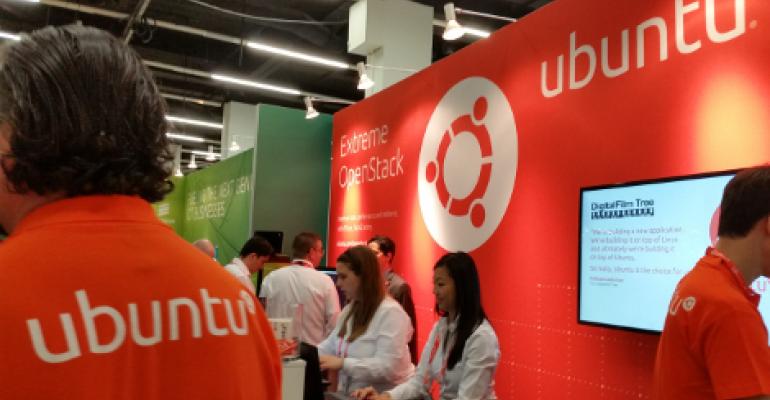From a rethinking of mobile strategy to a change in the CEO office, big changes are afoot at Canonical, the company behind Ubuntu Linux. Here's what they could mean for the future of the open source company and the software it produces.
Canonical is a major company in the open source space. Founded in 2004, Canonical is not as old or as big as competitors like Red Hat. The latter is a publicly traded company founded in the heady days of the late 1990s, when the dot com world was bubbling over and Linus Torvalds was considered the fifteenth-most important person of the twentieth century.
In the thirteen years since its launch, however, Canonical has made a big splash in the open source world. It has produced Ubuntu, which is probably the most popular Linux distribution ever for desktop as well as cloud computing. Backed by a ten million-dollar purpose trust funded by Mark Shuttleworth, Canonical's founder and sometime CEO, Ubuntu breathed important new life into the open source space starting in the mid-2000s, when other Linux companies were going bankrupt and it was unclear whether open source would ever become more than just something geeks played with.
Since that time, Canonical has evolved in many ways. It expanded its focus to include not just desktops, servers and the cloud, but also mobile and other smart devices. It began working closely with Microsoft, a company whose market dominance Shuttleworth -- who in 2010 stepped down from his CEO role at Canonical to focus on software design at the company -- once identified as "bug number one" for Ubuntu.
Changing Times at Canonical: Back to the Future?
Fast forward to the present, and it kind of looks like Canonical is stepping back in time. The company recently announced several major changes:
- Jane Silber, who had served as CEO since Shuttleworth left the position in 2010, departed the company. Shuttleworth will now step back into the role.
- Canonical will discontinue work on Unity, a custom interface that the company had been building with the goal of providing a common user environment for Ubuntu on desktops, smartphones, tablets and even TVs.
- Relatedly, Canonical says it will shift its focus away from mobile computing and home to focus instead on desktops, servers, cloud and IoT.
In some ways, these changes don't seem as momentous as they may sound. Although Shuttleworth officially left the CEO position at Canonical in 2010, he continued to do CEO-like things since that time -- like announce new products and design plans for Ubuntu. Silber cleared played a substantive role in leading the company, too, but it never seemed to me like Shuttleworth had fully relinquished the CEO role in pratice. In that sense, the fact that he now officially holds it again seems unremarkable.
I also don't think it's shocking that Canonical has backed away from mobile. It was never highly successful in that regard. It did succeed in forging partnerships with other vendors to ship Ubuntu-powered phones and tablets. But Ubuntu never became more than a niche player in the mobile world. It never had a serious chance against Android and iOS.
As for Unity, I may be a bit biased; I never really found Unity compelling. But I was not alone. Unity has always been controversial. I suspect lots of folks will be happy to see Ubuntu swing back toward GNOME as the default desktop environment. It helps make Ubuntu more consistent with upstream development once again and it alleviates concerns that Ubuntu could become a closed-stack operating system designed to work only with components from Canonical.
Pleasing the VCs?
The undercurrent to all of the recent change at Ubuntu is news that Canonical is seeking investor funding. While the relationship between that initiative and the changes remains unclear, one wonders whether the company's moves reflect an effort to please investors.
I think there's a good chance they do. With Shuttleworth playing something of shadow CEO, and Canonical dumping money into a mobile market where it faced a virtually impossible battle against entrenched competitors, the company for the last several years has not looked like one into which your typical venture capitalist would want to dump money.
Previously, Canonical could do what it liked because it was a public company -- and one that benefited in special ways from the purpose trust Shuttleworth had set up. Going forward, if Canonical wants to play the VC game, it will have to act more like a lean tech startup.
There's nothing wrong with that, but it will change the nature of Canonical. Shuttleworth told me in an interview in 2015 that he founded Canonical because he was a millionaire and wanted to spread free software as a sort of charitable endeavor. "I didn't have to work and I wanted to help people do great things," he said.
It's possible for a funded tech company to make money and do good things at the same time. But if Canonical reorganizes itself to please investors, it's likely that it will place more emphasis on making money than doing good.
My guess is that the recent changes at Canonical will culminate in turning the company into one that looks more like Red Hat -- a company that does plenty of good within the open source space, but that exists first and foremost to make money -- than the disinterested champion of software freedom and accessibility that Canonical has strived to be for the first fourteen years of its existence.
This article first appeared on The VAR Guy.






